Related Research Articles
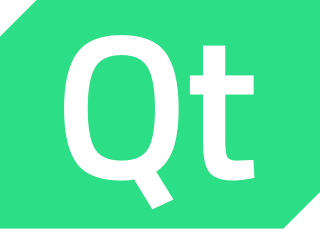
Qt is cross-platform software for creating graphical user interfaces as well as cross-platform applications that run on various software and hardware platforms such as Linux, Windows, macOS, Android or embedded systems with little or no change in the underlying codebase while still being a native application with native capabilities and speed.
In computing, cross-platform software is computer software that is designed to work in several computing platforms. Some cross-platform software requires a separate build for each platform, but some can be directly run on any platform without special preparation, being written in an interpreted language or compiled to portable bytecode for which the interpreters or run-time packages are common or standard components of all supported platforms.
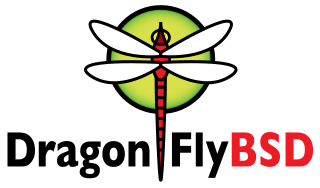
DragonFly BSD is a free and open-source Unix-like operating system forked from FreeBSD 4.8. Matthew Dillon, an Amiga developer in the late 1980s and early 1990s and FreeBSD developer between 1994 and 2003, began working on DragonFly BSD in June 2003 and announced it on the FreeBSD mailing lists on 16 July 2003.

OpenAL is a cross-platform audio application programming interface (API). It is designed for efficient rendering of multichannel three-dimensional positional audio. Its API style and conventions deliberately resemble those of OpenGL. OpenAL is an environmental 3D audio library, which can add realism to a game by simulating attenuation, the Doppler effect, and material densities.

DTrace is a comprehensive dynamic tracing framework originally created by Sun Microsystems for troubleshooting kernel and application problems on production systems in real time. Originally developed for Solaris, it has since been released under the free Common Development and Distribution License (CDDL) in OpenSolaris and its descendant illumos, and has been ported to several other Unix-like systems.
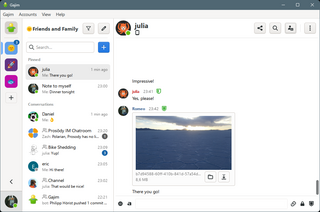
Gajim is an instant messaging client for the XMPP protocol which uses the GTK toolkit. The name Gajim is a recursive acronym for Gajim's a jabber instant messenger. Gajim runs on Linux, BSD, macOS, and Microsoft Windows. Released under the GPL-3.0-only license, Gajim is free software. A 2009 round-up of similar software on Tom's Hardware found version 0.12.1 "the lightest and fastest jabber IM client".

OpenBGPD, also known as OpenBSD Border Gateway Protocol Daemon, is a server software program that allows general purpose computers to be used as routers. It is a Unix system daemon that provides a free, open-source implementation of the Border Gateway Protocol version 4. This allows a machine to exchange routes with other systems that speak BGP.
OSSEC (Open Source HIDS SECurity) is a free, open-source host-based intrusion detection system (HIDS). It performs log analysis, integrity checking, Windows registry monitoring, rootkit detection, time-based alerting, and active response. It provides intrusion detection for most operating systems, including Linux, OpenBSD, FreeBSD, OS X, Solaris and Windows. OSSEC has a centralized, cross-platform architecture allowing multiple systems to be easily monitored and managed. OSSEC has a log analysis engine that is able to correlate and analyze logs from multiple devices and formats.

MonoDevelop was an open-source integrated development environment for Linux, macOS, and Windows. Its primary focus is development of projects that use Mono and .NET Framework. MonoDevelop integrates features similar to those of NetBeans and Microsoft Visual Studio, such as automatic code completion, source control, a graphical user interface (GUI) and Web designer. MonoDevelop integrates a Gtk# GUI designer called Stetic. It supports Boo, C, C++, C#, CIL, D, F#, Java, Oxygene, Vala, JavaScript, TypeScript and Visual Basic.NET. Although there is no word from the developers that is has been discontinued, nonetheless it hasn't been updated in 4 years and is no longer installable on major operating systems, such as Ubuntu 22.04 and above. Its parent Microsoft, seems to have shifted focus to Visual Studio Code and the .NET Framework, which runs on many operating systems, including Linux.

Redis is an open-source in-memory storage, used as a distributed, in-memory key–value database, cache and message broker, with optional durability. Because it holds all data in memory and because of its design, Redis offers low-latency reads and writes, making it particularly suitable for use cases that require a cache. Redis is the most popular NoSQL database, and one of the most popular databases overall. Redis is used in companies like Twitter, Airbnb, Tinder, Yahoo, Adobe, Hulu, Amazon and OpenAi.
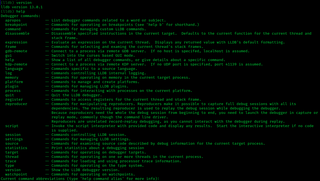
The LLDB Debugger (LLDB) is the debugger component of the LLVM project. It is built as a set of reusable components which extensively use existing libraries from LLVM, such as the Clang expression parser and LLVM disassembler. LLDB is free and open-source software under the University of Illinois/NCSA Open Source License, a BSD-style permissive software license. Since v9.0.0, it was relicensed to the Apache License 2.0 with LLVM Exceptions.
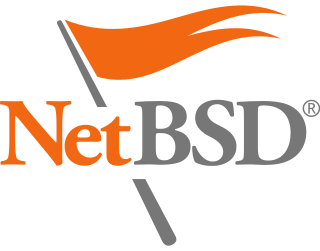
NetBSD is a free and open-source Unix operating system based on the Berkeley Software Distribution (BSD). It was the first open-source BSD descendant officially released after 386BSD was forked. It continues to be actively developed and is available for many platforms, including servers, desktops, handheld devices, and embedded systems.
Bionic is an implementation of the standard C library, developed by Google for its Android operating system. It differs from the GNU C Library (glibc) in being designed for devices with less memory and processor power than a typical Linux system. It is a combination of new code and code from FreeBSD, NetBSD, and OpenBSD released under a BSD license, rather than glibc, which uses the GNU Lesser General Public License. This difference was important in the early days of Android, when static linking was common, and is still helpful in introducing Android to software companies used to proprietary operating systems, who can be wary of the LGPL, and unclear about the differences between it and the full GNU General Public License (GPL).

OpenZFS is an open-source implementation of the ZFS file system and volume manager initially developed by Sun Microsystems for the Solaris operating system and now maintained by the OpenZFS Project. It supports features like data compression, data deduplication, copy-on-write clones, snapshots, and RAID-Z. It also supports the creation of virtual devices, which allows for the creation of file systems that span multiple disks.

Godot is a cross-platform, free and open-source game engine released under the permissive MIT license. It was initially developed by Argentine software developers Juan Linietsky and Ariel Manzur for several companies in Latin America prior to its public release in 2014. The development environment runs on many platforms, and can export to several more. It is designed to create both 2D and 3D games targeting PC, mobile, and web platforms and can also be used to develop non-game software, including editors.

LibreSSL is an open-source implementation of the Transport Layer Security (TLS) protocol. The implementation is named after Secure Sockets Layer (SSL), the deprecated predecessor of TLS, for which support was removed in release 2.3.0. The OpenBSD project forked LibreSSL from OpenSSL 1.0.1g in April 2014 as a response to the Heartbleed security vulnerability, with the goals of modernizing the codebase, improving security, and applying development best practices.
References
- 1 2 3 4 "Quickfix". GitHub . 21 October 2021.
- ↑ "QuickFix: Open Source FIX Engine". Archived from the original on March 18, 2009. Retrieved March 20, 2009.
- 1 2 Boysen, Ryan (August 11, 2014). "QuickFIX Creators Honored". Financial Technologies Forum.